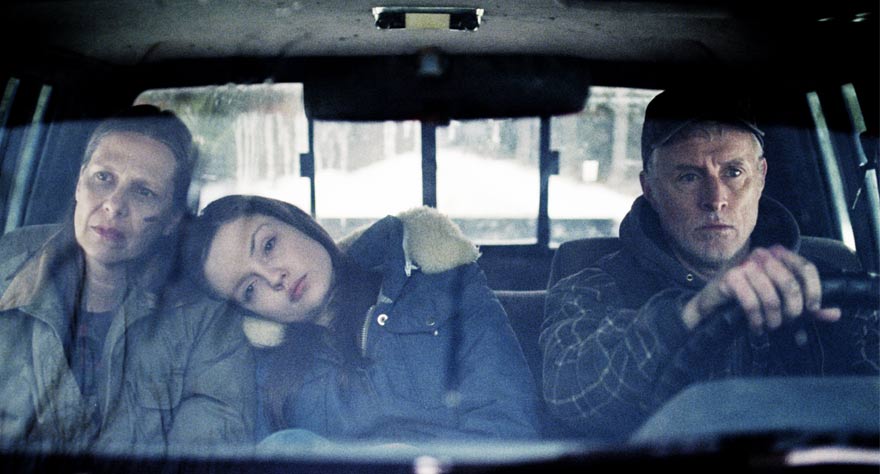
Small-town tragedy wracks guilt in this muted character piece.

Small-town tragedy wracks guilt in this muted character piece.
Bluebird is a quiet, understated film from first time filmmaker Lance Edmands on the ripple-effect tragedy projects on an isolated town. Mother nature plays a vital part in the film, demonstrating her unforgiving ways extend even to the most remote and silent areas. The film is a straightforward yet honest look at how people deal with their own morality, and by treating the characters as humans instead of criminals, Edmands allows for contemplative evaluation in unexpected areas.
Winter time in Maine can be very cold, but a small logging town experiences a different kind of chill when tragedy strikes. On one particularly cold morning, Lesley (Amy Morton) notices a small bluebird fly inside the school bus she drives during her routine end-of-day cleaning. She pauses only for a moment, staring at the out-of-place bird, distracting her attention away from her duties. The next morning she realizes the severity of this distraction. As she opens the bus doors to begin her day, Lesley notices a lifeless kid near the back she failed to notice the day before. Turns out that the boy went into hypothermic shock and now remains in a coma after spending the night passed out on the frigid bus.
But is Lesley solely to blame for this misfortune? Sure, she neglected her job-related responsibilities in an honest oversight. But what about the child’s parent? After all, no calls were made about a missing boy into the school or the local police. That’s because Marla (Louisa Krause), the boy’s single parent, spends more time out partying than attending to her child, and she completely forgot about picking him up. To make the situation even sadder, Marla seems largely unaffected, feeling only a fraction of the guilt Lesley does. When Marla weeps it seems to be only because she feels guilty about not feeling enough guilt, and perhaps realizes for the first time that she doesn’t make a good parent.
Thankfully, Bluebird isn’t concerned with which character deserves the most blame. Both Lesley and Marla are equally at fault; one legally and one morally, there are no true villains in this story. Instead, the film is more about how characters deal with the aftermath of the accident. Morton’s constant state of regret makes it easy to feel sorry for her character, especially during moments when she can no longer contain her emotions. But Morton never over-dramatizes the grief her character experiences, which is difficult when the character spends the entire film in an overwhelming state of mental suffering. Krause didn’t have the luxury of playing the favorable character, but her sympathetic performance demonstrates just enough humanity to not completely condemn her. Some of the supporting characters, such as Lesley’s daughter (Emily Meade) and husband (John Slattery), don’t quite make the impact they should have, even as side characters, given the objective of exploring how one event affects multiple lives. Minor script issues aside, their performances were also commendable.
Cinematographer Jody Lee Lipes (Martha Marcy May Marlene, Tiny Furniture) captures the dreary landscapes of a desolate town on grainy 35mm film stock. Falling snow and cold breaths depict the winter season outside, while a blue-ish tint and muted aesthetics imply the coldness characters feel on the inside. These awe-inspiring visuals pair well with the moody script to create a chilling atmosphere.
Small town tragedy stories like this have been done many times before, most recently in Little Accidents, but they’re often paired with a heavy-handed lesson or the pursuit of justice through finger-pointing. Bluebird wisely side-steps these tropes by not telling us how to feel about the situation, nor forces us to choose sides. The film also expresses the underlying theme of isolation: the lone bluebird, an abandoned child, a small community surrounded by mountains, and a single parent. Edmands finds the right balance between atmospheric undertones and understated storytelling, managing to get solid performances from his cast—it’s easy to forget we’re watching the work of a first-time director.